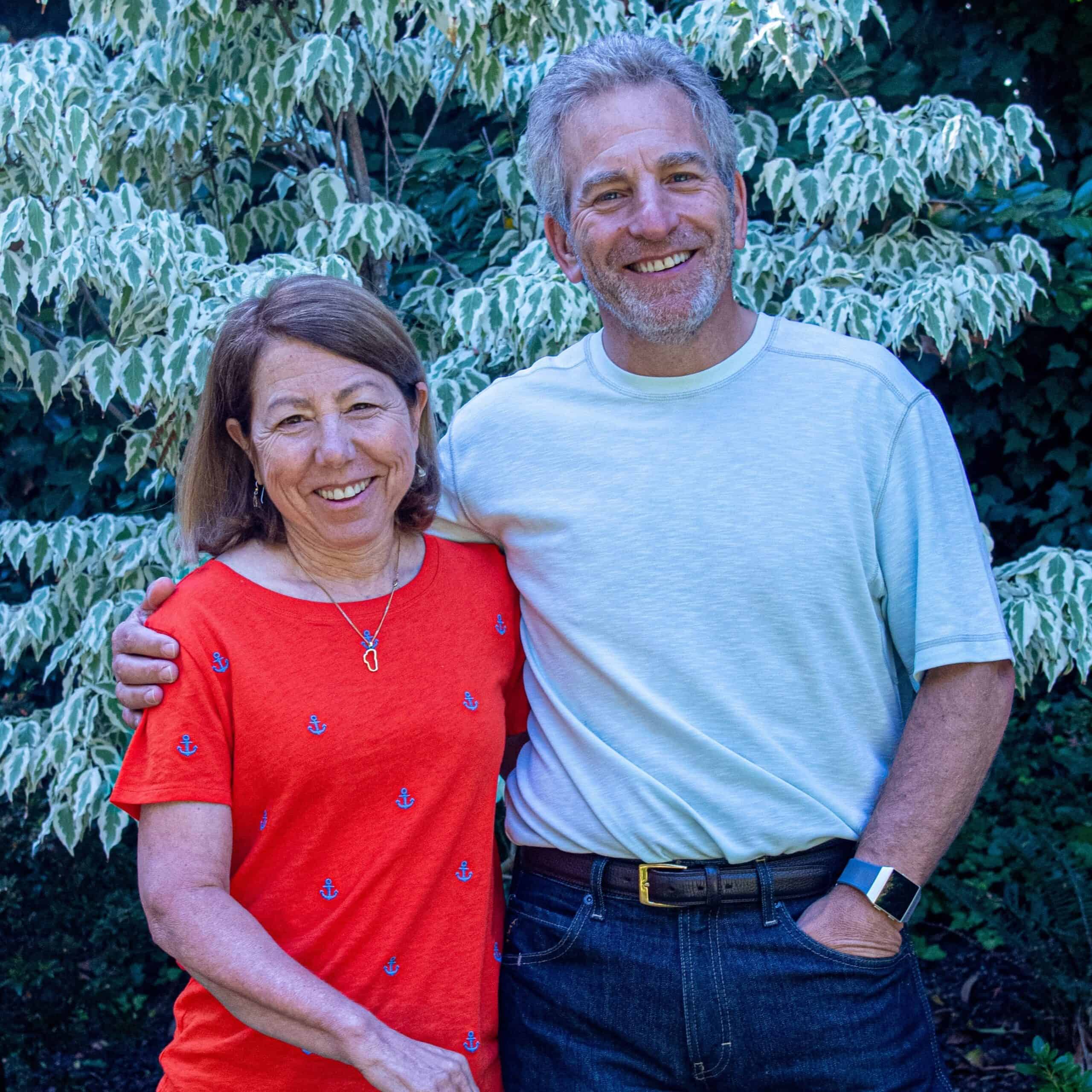
Debra E. Meyerson, Ph.D. & Steve Zuckerman
Identity Theft: Rediscovering Ourselves After Stroke (Second Edition)
Debra was a professor at Stanford, forced from that role by a severe stroke. Steve is her husband, care partner, and social entrepreneur. They are co-founders of Stroke Onward.
Menlo Park, CA (San Francisco)
BOOK COVER

BOOK DETAILS
Pub Date: September 16, 2025
Genre: Health/Wellness
Publisher: Andrews McMeel Publishing
Page Count: 336
Format, ISBN, Price:
Paperback, 9781524895570, $19.99
eBook, B0F1DWBD4V, $9.99
Documentary
Stroke Across America: Trauma, Adaptation, Purpose
ABOUT THE BOOK
Identity Theft, Second Edition is an update to the award-winning book that follows Stanford professor Debra Meyerson’s journey to recover from a severe stroke that initially left her physically incapacitated and unable to speak. In addition to providing realistic expectations for the hard work needed to regain everyday capabilities, Meyerson and Zuckerman focus on the less frequently documented – but equally critical – emotional journey as she and her family rebuild identity in recovery. The second edition adds perspective from an additional five years of continued recovery and rebuilding their lives, including insights from the work of the nonprofit they co-founded – Stroke Onward.
The audiobook, narrated by Julia Whelan, is available on Audiobrary. Whelan, who has narrated more than 600 fiction and nonfiction titles, explained why she was drawn to this project: “I thought Deb has a very interesting perspective on an aspect of recovery I hadn’t seen discussed before. Deb’s story really struck me as someone who not only relies so heavily on her cognitive function to do her job (not unlike a professor) but quite obviously my voice. It made me consider how I would redefine my identity if I didn’t have that anymore.”
Virtually every stroke survivor is haunted by questions like “Who am I now?” and “How do I rebuild a meaningful and rewarding life?” after losing so much of what they had before—capabilities, careers and jobs, relationships, and more. Identity Theft, Second Edition is a book full of hope for survivors—from stroke or other life-changing injuries or illnesses—as well as actionable advice for their care partners, families, and communities.
The first edition of Identity Theft centered on Debra’s experience: her stroke in 2010, her extraordinary efforts to recover, and her journey to redefine herself. But she also draws on her skills as a social scientist, sharing stories from several dozen fellow survivors, family members, friends, colleagues, therapists, and doctors she met and interviewed. By sharing this diversity of experiences, Debra highlighted how every stroke is different and every recovery is different. She provided a valuable look at the broad possibilities for successfully navigating the challenging physical recovery, and the equally difficult and frequently unspoken emotional journey toward rebuilding one’s identity and a rewarding life after a trauma like a stroke.
The new content in this second edition was written by Debra and her spouse, Steve Zuckerman. As they have shared in countless talks, “Just as the original book was headed to the printers, we decided that ‘the finish line had become a new starting line.’” They co-founded the nonprofit Stroke Onward to build an organization that can catalyze change in the healthcare system to better integrate the emotional journey of rebuilding identity into a lifelong recovery process.
This edition draws on five more years of experience as a post-stroke couple and what they’ve learned from thousands more survivors, family members, and healthcare professionals. They’ve added new insights about the long-term recovery process and how we can change the stroke system of care to better support all survivors and their families.
ABOUT THE AUTHORS
Previously a tenured professor at Stanford University, Debra Meyerson studied, wrote, lectured, and taught about diversity, gender, identity, and organizational change. In September 2010, Debra’s life and career were derailed by a severe stroke that initially left her paralyzed on the right side and completely mute. Years of intensive therapy and a relentless work ethic enabled Debra to regain her independence, but she still lives with physical limitations and speech challenges. Debra wrote Identity Theft to help other survivors and those closest to them navigate the emotional journey that she found very difficult—and rewarding. Debra lives with her husband in Menlo Park, California, and has three grown children.
Steve Zuckerman is Debra’s husband and life partner since 1988, and her carepartner since her stroke in 2010. He had a successful first career as a business leader and then, in 2006, launched West Coast operations for Self-Help, a nationally recognized nonprofit financial and policy institution with a mission to create and protect ownership and economic opportunity for underserved communities. After co-founding Self-Help Federal Credit Union in 2008 and serving as president for twelve years, he stepped out of his leadership role (still working there part-time) to launch and build Stroke Onward, with Debra, to support stroke survivors and their families and catalyze change in the stroke system of care.
Their 4,500-mile bike ride called Stroke Across America in 2022 helped raise awareness for Stroke Onward and stroke survivorship care. The trip is the subject of a 30-minute documentary produced by WCNY (Syracuse, NY) that will air on November 9 and is currently raising sponsorship funding for national PBS distribution.
TIMELY TIE-INS
November
- National Family Caregivers Month
SUGGESTED INTERVIEW QUESTIONS
- Debra suffered her stroke in 2010, but it was losing tenure at Stanford three years later that inspired her to write the first edition of Identity Theft.
- How did that event in 2013 influence your thinking about the importance of identity in recovery?
- How did writing the book inspire your nonprofit, Stroke Onward?
- What did you learn and experience after the release of the first edition that inspired you to write a second edition now?
- You see the power of adaptation – finding new ways to do the things that matter – as vital to a rewarding life after stroke, and your Stroke Across America bicycle trip in 2022 was a dramatic example of that. How did that trip come about? How did it influence your ongoing recovery and ongoing work?
- Most people think about stroke recovery in terms of critical care (regaining physical health) and rehabilitation (regaining capabilities). Why do you think it’s so important to focus on “rebuilding identity” and the broader emotional journey in recovery?
- You use the term “carepartner” instead of the more familiar “caregiver.” What is the difference, and why is that difference important?
- In the book, one chapter is titled “Stroke is a Family Illness.” How are family members impacted by stroke, and the support they need in their recoveries?
- Artificial Intelligence is not universally embraced, but what role is it playing in supporting stroke survivors in rebuilding their identities?
- The book’s focus is on stroke and stroke survivors. Can the lessons you’ve learned apply to other life events?
PRAISE
“Identity Theft is the most powerful book I’ve read on the psychological experience of having and recovering from a stroke. This is a moving memoir—and a testament to the strength of the human spirit.”
—Adam Grant, #1 New York Times Best Selling Author of Hidden Potential, Think Again, and Option B
“Identity Theft is an inspiring and deeply personal account of Debra’s journey as a stroke survivor. Facing similar challenges, I found it incredibly relatable and empowering. This book offers invaluable insight and hope and is an indispensable resource for stroke survivors and care partners.”
—Dipika Aggarwal, MD, Neurologist, University of Kansas Health System, Stroke Survivor, Cancer Survivor
“Identity Theft is a great read for survivors, families, and professionals. It adds important voices and perspectives to the stroke recovery landscape and, most importantly, helps people see there is a way forward, even in the face of adversity. Debra and Steve highlight the important emotional journey in recovery with clarity, depth, vulnerability, and warmth.”
—Carol Persad, Ph.D., ABBP, Clinical Professor, Director of Neuropsychology Program and University Center for Language and Literacy, University of Michigan
“Identity Theft deeply resonates with my personal journey. It’s a powerful narrative that captures the emotional and physical challenges of rebuilding one’s life after stroke—not just regaining abilities but rediscovering who we are.”
—Lawnae Hunter, Owner, Plus Property Management, Stroke Survivor, Cofounder, Awareness Oregon
“Identity Theft is a game changer for stroke survivors and families. It dives deep into the emotional journey of recovery, emphasizing the importance of rediscovering yourself. A must-read for anyone navigating life after stroke. Powerful, insightful, and incredibly helpful.”
—Carol Dow-Richards, Carepartner, Cofounder and Executive Director, Aphasia Recovery Connection
“Identity Theft will provoke thoughts, ideas, and paths to growth for anyone wrestling with identity in the face of life changes. Even while struggling with the aftermath of Debra’s stroke, she and Steve found a way to create this gift to others.”
—Lawrence Bacow, President Emeritus, Harvard University
“Identity Theft is a scholarly yet easy-to-read exposition that addresses so many issues faced by stroke survivors, especially those with aphasia. It is a story of determination and hope that should be of interest to everyone.”
—Leora R. Cherney, Ph.D., Scientific Chair, think + Speak Lab, Shirley Ryan AbilityLab; Professor, Physical Medicine & Rehabilitation, Northwestern University
“A colleague who is a speech therapist gifted me Identity Theft following my series of strokes. It is, by far, the best stroke book I’ve read! One chapter after another resonated with my experiences and gave me new ideas for effectively rebuilding a full and rewarding life.”
—Timothy K. Behrens, Ph.D., CHES, PFSA, FACSM; Stroke Survivor; Professor, School of Rehabilitation Science & Technology, University of Wisconsin-Milwaukee
“The first edition of Identity Theft advanced my understanding of stroke recovery. This second edition provides further insight into the emotional journey and chronic nature of stroke recovery. Debra and Steve shine a spotlight on this critical, yet often overlooked, part of the stroke journey.”
—Blaise Morrison, Ph.D., HSP-P, CRC, LPC, Assistant Professor, Clinical Rehabilitation and Mental Health Counseling, UNC School of Medicine
“It is a rare book that can begin with medical trauma and loss of self-identity and turn into a deeply moving, surprisingly uplifting, and profoundly wise meditation on what it means to be human.”
— Rob Reich, Professor of Political Science, Stanford University; Author of Just Giving and coauthor of System Error
“Identity Theft is a must-read for stroke survivors, their families, and stroke professionals. Using their story, and those of others, Debra and Steve write with humor and pragmatism about
embracing and thriving in new identities after stroke.”
—Dr. Chitra Venkatasubramanian, MBBS, MD, MSC, FNCS, Professor, Stroke and Neurocritical Care, Stanford University
“A powerful and emotionally rich exploration of the experience of living with aphasia after stroke. Meyerson’s background in sociology and in identity research gives her a distinctive survivor voice. Zuckerman’s voice is an important addition—stroke really is a family illness.”
—Barbara B. Shadden, Ph.D., CCC-SLP, Board Certified ANCDS, Professor Emeritus, Program in Communication Disorders, University of Arkansas
BOOK DETAILS
Pub Date: May 17, 2022
Genre: Memoir / Christian Inspirational
Publisher: She Writes Press
Page Count: 304
Format: Paperback
ISBN: 978-1647429003
Price: $15.99

